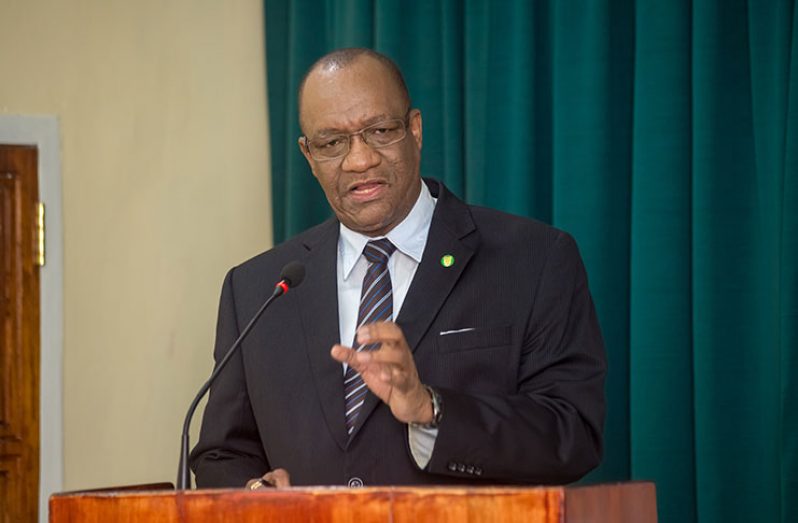…PNCR accuses PPP of manipulation
…Harmon: GECOM responsibility is to provide clean list
THE two largest parties of the coalition government believe that the current voters’ list is “compromised” and would be a grave injustice to Guyanese should the country move forward with it to elections.
The parties said the list consists of thousands of dead persons and does not include many now eligible to vote. Commissioners of the Guyana Elections Commission (GECOM) are expected to meet today to discuss when new General and Regional Elections can be held. The Guyana Chronicle invited party heads to weigh in on the matter.
“I believe that the list is compromised. This is not only a list that we have to take off dead people or people who are removed from the community, this is a list where the PPP used their returning officers, in the villages where people are pro-PPP, to move people from one area to the next during local government elections and therefore we consider the list compromised,” People’s National Congress/Reform (PNC/R) General Secretary Amna Ally said in an invited comment on Wednesday.
These are issues, she added, that the coalition parties have noticed in past and even the most recent elections. Ally said in Region Nine (Upper Takutu-Upper Essequibo), persons were moved by certain political affiliates from the neighbouring town of Bonfim in Brazil to Lethem with the aim of having them vote as residents.
She noted that this is only one example and similar illegalities have occurred in places such as Coomacka; Hosororo; Wainaina and Mabaruma.
“You have problems where people are being transferred into Mabaruma to vote at Mabaruma, so the list is compromised,” she maintained, adding: “A host of people who would have attained the age would be disqualified if the old list is used.”
GECOM’s Secretariat in 2018 had budgeted $3B for house-to-house registration in 2019 in keeping with its policy of conducting such every seven years.
However, this matter has become one of much contention since the no-confidence vote, as the opposition believes that the pre-planned exercise is merely a delaying tactic of the government to avoid holding elections within 90 days. Although courts are yet to decide on the validity of the no-confidence vote, the opposition is pushing for elections to be held before April 30, 2019, which is when the current voters’ list becomes invalid.
However, Alliance For Change (AFC) Chairman Khemraj Ramjattan, at a press conference last week cautioned that while the opposition has its own motives for the April deadline, such an important exercise cannot be conducted haphazardly. “At this stage, we are of the view that there should be house-to-house registration as we allocated monies for,” Ramjattan said.
“We’re not like Canada and the developed western democracy where when a no-confidence is had you immediately can go into elections. There are lots of 15-year-olds then that will now become 18-year-olds that will have to be put on the list. There are a lot of dead people on that list.”
He questioned the opposition’s intentions, highlighting that simply forging ahead for the sake of political reasons would not be fair to Guyanese or the democratic process. “GECOM had indicated that every seven years it is going to do a house-to-house registration and the PPP agreed. That is why they said yes to that $3B to do a house-to-house. So are we going to retract on that? Then we’re going to disenfranchise a number of people who have now become 18-year-olds? We’re not going to cleanse the list of all the people that have died? It is important that a lot of this be understood and that we’re not just running in with a list that is defective and the first thing when you win the election as the coalition they’ll say is, ‘this thing was rigged’,” he said.
SANITISATION
A Partnership for National Unity (APNU) General-Secretary Joseph Harmon also weighed in on the matter on Wednesday. While the PPP had previously called for a sanitisation of the list through the General Registrar’s Office (GRO), when questioned on the difference between such and house-to-house registration, Harmon noted that not much exists.
“House-to-house [registration] also sanitises. So when you’re talking about sanitisation of a list, you’re basically speaking about making that list ready for an election,” Harmon said, adding:
“If you’re talking about sanitisation, you’re actually also acknowledging that the list is not perfect.”
Speaking further, he said that before any electors’ list is produced, there are certain activities which are duly conducted and to ensure there is a just end result. “There’s a whole process that leads to the production of a list of electors for an election and that process requires registration; it requires claims and objections and all of these issues are dealt with in this process,” he said.
However, Harmon reminded that despite the reservations of various parties, it is ultimately the elections commission that has the responsibility for providing a clean list. He said: “GECOM has to make the authoritative statement on the matter. GECOM is the custodian of the list and GECOM is the entity that will be responsible for ensuring that we have a clean list, so it is important that we understand that GECOM is the institution that has responsibility for a voters’ list and so political parties may have issues on the list, but it is GECOM that is the organisation, the institution that has to deal with the voters’ list.”



.jpg)









